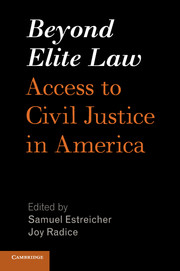Book contents
- Frontmatter
- Contents
- Beyond Elite Law
- Foreword
- List of Contributors
- Overview
- Overview
- PART I CURRENT STATE OF ACCESS TO LEGAL SERVICES
- PART II SOURCES OF LEGAL SERVICES ASSISTANCE FOR WORKING AMERICANS
- PART III FASHIONING A REFORM AGENDA
- 23 New York State Task Force to Expand Access to Civil Legal Services
- 24 New York's 50-hour Pro Bono Requirement
- 25 Starting a “Low Bono” Law Practice
- 26 Toward a More Effective and Accessible Solo and Small Firm Practice Model
- 27 Facilitating Homemade Wills
- 28 Court Facilitation of Self-Representation
- 29 Limited Representation and Ethical Challenges
- 30 Technology Can Solve Much of America's Access to Justice Problem, If We Let It
- 31 Mediation of Employment Disputes at the EEOC
- 32 AAA Consumer Arbitration
- 33 Saturns for Rickshaws: Lessons for Consumer Arbitration and Access to Justice
- 34 Employment Arbitration in the Securities Industry
- 35 FINRA Arbitration and Employment Disputes
- 36 Arbitration as an Employee-Friendly Forum
- 37 Access to Justice in Employment Arbitration: a Critical Look
- 38 Collaborative Technology Improves Access to Justice
- 39 Union Representation in Employment Arbitration
- 40 Legal Representation for New York City's Chinese Immigrant Workers
- 41 Reassessing Unauthorized Practice of Law Rules
- 42 The Pyett Protocol: Collectively-Bargained Grievance Arbitration as a Forum for Individual Statutory Employment Claims
- PART IV CREATING A CULTURE OF SERVICE
- Index
36 - Arbitration as an Employee-Friendly Forum
from PART III - FASHIONING A REFORM AGENDA
Published online by Cambridge University Press: 05 May 2016
- Frontmatter
- Contents
- Beyond Elite Law
- Foreword
- List of Contributors
- Overview
- Overview
- PART I CURRENT STATE OF ACCESS TO LEGAL SERVICES
- PART II SOURCES OF LEGAL SERVICES ASSISTANCE FOR WORKING AMERICANS
- PART III FASHIONING A REFORM AGENDA
- 23 New York State Task Force to Expand Access to Civil Legal Services
- 24 New York's 50-hour Pro Bono Requirement
- 25 Starting a “Low Bono” Law Practice
- 26 Toward a More Effective and Accessible Solo and Small Firm Practice Model
- 27 Facilitating Homemade Wills
- 28 Court Facilitation of Self-Representation
- 29 Limited Representation and Ethical Challenges
- 30 Technology Can Solve Much of America's Access to Justice Problem, If We Let It
- 31 Mediation of Employment Disputes at the EEOC
- 32 AAA Consumer Arbitration
- 33 Saturns for Rickshaws: Lessons for Consumer Arbitration and Access to Justice
- 34 Employment Arbitration in the Securities Industry
- 35 FINRA Arbitration and Employment Disputes
- 36 Arbitration as an Employee-Friendly Forum
- 37 Access to Justice in Employment Arbitration: a Critical Look
- 38 Collaborative Technology Improves Access to Justice
- 39 Union Representation in Employment Arbitration
- 40 Legal Representation for New York City's Chinese Immigrant Workers
- 41 Reassessing Unauthorized Practice of Law Rules
- 42 The Pyett Protocol: Collectively-Bargained Grievance Arbitration as a Forum for Individual Statutory Employment Claims
- PART IV CREATING A CULTURE OF SERVICE
- Index
Summary
Zev Eigen and David Sherwyn urge that, at a theoretical level, employment arbitration is superior to litigation because claimants are more likely to obtain a hearing irrespective of their income even if unable to attract counsel; and that empirical studies finding outcomes more favorable to employees in litigation than in arbitration are plagued by serious selection-effect problems.
The only comparison courts and policymakers should be making when assessing whether and to what extent arbitration is superior to litigation as a forum for resolving employment claims is how well does arbitration compare to the reality of employment litigation. Court actions are a problematic forum for addressing most employment disputes. The lower the compensation earned by the employee, the less likely it is that litigation provides a meaningful mode of obtaining redress. Similarly, the more likely an employer is a large, institutional repeat player in litigation, the more likely it is that the employer will be able to exploit the legal system to its advantage in the short run, by avoiding paying damages owed in legitimate claims, and in the long run, by selecting only the best cases to pursue in litigation, maximizing the development of employer-friendly precedent.
The primary objective of an employment dispute system should be to maximize the probability that employees who are actually wronged will recover the damages to which they are entitled – not less, not more. At the same time, the system should minimize the risk of employers having to pay out on baseless claims in order to avoid the costs of defending against such claims. This could be characterized as a distributive justice focus. The system must provide redress for those wronged in violation of the laws irrespective of their income, even if such broader access is obtained at the cost of sacrificing higher-value award for some claimants. This is perhaps in keeping with Samuel Estreicher's criticism of the litigation system as a “Cadillac” available to a limited percentage of employees, as compared to mandatory arbitration, which is like a “Saturn,” and thus available to many more, even if it lacks the fancy bells and whistles of the Cadillac. All else being equal, we prefer a dispute-resolution system that has fewer and lower barriers to its utilization, so that even lower-paid employees have a mode of redress.
- Type
- Chapter
- Information
- Beyond Elite LawAccess to Civil Justice in America, pp. 523 - 528Publisher: Cambridge University PressPrint publication year: 2016



